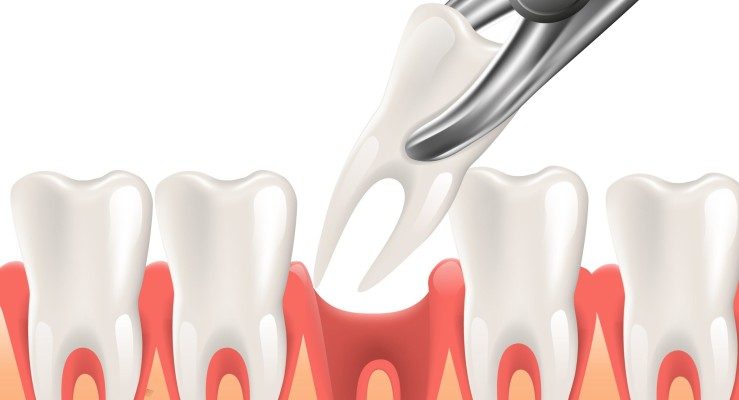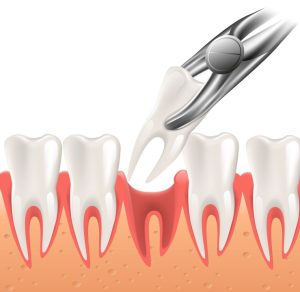
Do’s and Don’ts After Tooth Extraction:
It is crucial to understand how to take care of your extraction site following oral surgery, regardless of whether you are having a tooth extracted for wisdom teeth extraction, decay, trauma, or overcrowding.
You will receive a local anesthetic injection from your dentist during the procedure in order to numb the area and keep you from feeling pain, but you will still be conscious of what is going on around you. Your dentist will use an elevator to shake the tooth back and forth until it comes loose during a straightforward extraction. The tooth will then be extracted with dental forceps.
Day 1-2 postoperative instructions:
Keeping the blood clot in the tooth socket intact is essential for your recovery after tooth extraction. You can prevent future issues like dry sockets with this important phase in the healing process. A painful disease known as “dry socket” occurs when the blood clot breaks or fails to form, exposing the underlying bone and nerve endings.
Aftercare can be different based on the type of tooth extraction. Usually, it gets healed in 7–10 days.
Do’s for speedy recovery:
- Adequate rest: it’s important to get rest and relaxation for healing. In order to stop continuous blood flow and allow a clot to form, it is best to maintain your head as upright as possible.
- Take plenty of fluids: In addition to keeping your body hydrated, drinking water keeps your teeth clear of microorganisms. After having a tooth extracted, you should drink a lot of water to keep the extraction site clean and avoid infection. However, keep in mind that drinking through a straw can agitate the extraction site because of the sucking motion.
- Take care of swelling and pain: After the tooth extraction, it’s normal to have pain or swelling, which might linger for three days. in order to relieve any discomfort or swelling, always have an ice pack on hand. you can apply ice to your cheek every ten minutes to reduce swelling.
- Take painkillers: Following a tooth extraction, your dentist may recommend taking antibiotics and analgesics. When necessary, use pain relievers, and be sure to finish the antibiotics according to prescription until none remain. This lowers the possibility of complications and encourages healing.
- Take soft diet: In the first two days it is best to maintain a soft diet to avoid damaging the extraction site. You can take yogurt, rice, scrambled eggs and bread etc.
- Bite gauze: In order to promote normal blood clotting, your dentist will probably cover the area where your tooth was pulled with gauze. For a while, you can bite down lightly on the gauze to help stop the bleeding. When necessary, you can swap out the gauze with a fresh one.
- Keep extraction site clean: You might be able to give yourself a gentle mouthwash after 12-24 hours. Rinse four times a day, or as your dentist instructs by using a glass of warm water and 1/2 teaspoon of salt. You can gently brush your teeth without touching the extraction site and hindering the healing process.
Don’ts for speedy recovery:
- Don’t smoke: Smoking is injurious to overall health and in this case, it is bad for your oral health as well. It increases the chances of dry socket therefore decreasing the process of healing and recovery.
- Don’t drink carbonated beverages or alcohol: Complications can be caused due to intake of such beverages because it can damage the clot in our extraction site. It is better to avoid alcohol and carbonated beverages for at least 4 days due to their acidity.
- Avoid spitting: Spitting exerts pressure on the extraction site, which can interfere with blood coagulation, just like using a straw. Simply let any saliva or liquid you need to get out by letting it drip over the sink, rather than spitting.
- Avoid strenuous activity for 48 hours: Increased post-operative bleeding and discomfort can be caused by an increased heart rate. For the first 48 to 72 hours, skip going to the gym. Ask your dentist when it’s okay to return to your regular schedule.
When to call your dentist:
It’s important to monitor your recovery process after a tooth extraction. Contact your dentist immediately if you experience any of the following symptoms:
- Persistent Pain: Severe pain that does not diminish with time or prescribed painkillers.
- Infection Signs: Discharge of pus from the extraction site, indicating a possible infection.
- Fever: A temperature of 100.4°F (38°C) or higher, which can be a sign of infection or other complications.
These symptoms may indicate that you need further medical attention to ensure proper healing and avoid complications. Always err on the side of caution and reach out to your dental professional if you’re unsure.

